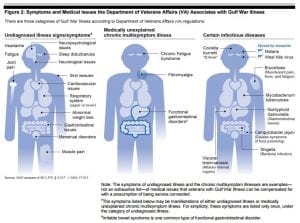Gulf War Compensation Denial Rate
Dept. Veteran Affairs denies more than 80% of veterans’ claims for benefits connected to Gulf War-related disabilities.
The U.S. Government Accountability Office filed a report in June of 2017 publishing the investigation on the VA’s denial of Gulf War claims. The VA estimated that 44% of veterans who served in the Persian Gulf War or who have been deployed to Southwest Asia have medical issues resulting from service. Yet despite this, these Veterans claims are being denied most frequently. This study was done to find out if the VA is processing these claims correctly.
“In Recent Years, Completed Gulf War Illness Claims Have Risen, Included More Medical Issues, and Been Approved at Lower Rates Than Other Service-related Disabilities” -GAO Gulf War Illness Report
According to Melissa Emery-Arras, the VA spent about $2 million in 2014 on GWI and couldn’t come up with a case definition.
According to the Department of Defense, the symptoms many Veterans are facing result from a multitude of chemicals. They may have been exposed to pesticides, smoke from oil well fires, depleted uranium and more. The symptoms presented were not ones that fit into the usual categories of illnesses faced. This resulted in confusion among many healthcare providers and raised the question, what does cause these mystery illnesses.
What classifies as Gulf War Illness?
Gulf War Illness can include a wide range of chronic illness. These include fatigue, headaches, joint pain, indigestion, insomnia, respiratory disorders, skin problems, and memory impairment. The cause of these illness’ is not known, and the symptoms range drastically from person to person. But, Gulf War Illness can include multiple different illnesses, including up to 9 different diseases.
To receive benefits classifying under GWI, you had to have served active duty in Southwest Asia after August 2, 1990, and fall under one of three categories.

How do I get my claim approved?
The VA can award you benefits if you served in the Gulf War and currently display symptoms from service, without you having to get a medical exam. But, by getting a medical exam, it can help solidify your claim and assess the severity of the disability. The VA also provides compensation if your GWI falls under one of three categories:
Undiagnosed Illnesses
You have to have served active duty in Southwest Asia between August 2, 1990, to the present. And, have a chronic disability from an undiagnosed illness, a medically unexplained chronic multisymptom illness or both. This had to have taken place during active duty a 10% rating or more before December 31, 2021.
Medically unexplained chronic multisymptom illnesses
Nine specific infectious diseases
These are diagnosable conditions which have been linked to exposure in Southwest Asia. If you are diagnosed with one of these qualifying diseases, your claim should be granted. If your Gulf War-related claim has been denied before, the Federal law entitles you to compensation benefits if you can prove that your disability is related to service.
These veterans have to wait an average of four months longer to hear back from the VA.
The VA made this training for VA examiners optional. Resulting in a majority of the medical examiners do not know how to correctly assess this type of claim.
VA needs to have specific people in the VA office who work with Gulf War Claims, not just catch-alls.
At the end of the study done by the GAO, they recommended that the VA require training for medical examiners to learn more about GWI and improve decision letters. They also asked that the VA create a definition for GWI claims. The VA agreed, but still, not much has been done to fix this.
